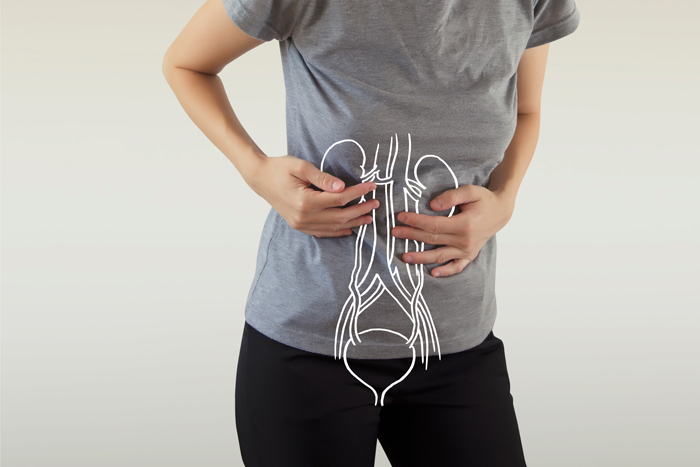Kidney Diseases Treatment & Diagnostics in Tardeo, Mumbai
Kidney Diseases
The kidneys are a pair of bean-shaped organs that filter out waste products and excess water from the blood. Sometimes, these organs are affected by infections, stones and diseases. This can hinder the filtration process they are responsible for. Fortunately, there are several minimally invasive procedures that can treat kidney diseases. To schedule an appointment with a specialist, google "urology doctors in Mumbai".

What are kidney diseases?
Kidney diseases are a group of diseases that affect your kidneys and prevent them from effectively performing their functions. Damage to your kidneys is usually caused by long-term health conditions of your body. Kidney diseases can also lead to other problems and complications including weak bones, malnutrition and nerve damage.
What are the symptoms of kidney diseases?
Kidney diseases tend to go unnoticed until the condition progresses to a severe stage. Here are some of the early warning symptoms of kidney diseases:
- Difficulty in concentration
- Frequent and urgent urination
- Dry, scaly skin
- Swollen ankles and feet
- Cramps
- Puffiness around your eyes
- Nausea and vomiting
- Loss of appetite
- Fluid retention
- Changes in urine
- Anemia
- Decreased sex drive
- Hyperkalemia (an increase in potassium levels)
- Inflammation in your pericardium
When do you need to consult a doctor?
If you notice serious signs of kidney diseases, seek immediate medical attention. To be on the safer side, consult a urology doctor in Tardeo when you notice milder symptoms or suspect a kidney disease.
You can request an appointment at Apollo Spectra Hospitals, Tardeo, Mumbai.
Call 1860 500 2244 to book an appointment.
What are the causes of kidney diseases?
Here are some of the most common causes:
- Kidney stones: Kidney stone is a common kidney condition that occurs when minerals crystallize in your kidneys leading to the formation of stones. They might come out when you urinate, this can be painful.
- Glomerulonephritis: This condition is characterized by the inflammation of the glomeruli (small structures that filter the blood in your kidneys). It can be caused by drugs, infections and disorders.
- Polycystic kidney disease: This is a genetic disorder that causes several cysts in your kidney. They can interfere with your kidney's function and lead to kidney failure.
- Urinary tract infections: Urinary tract infections are infections in any part of your urinary system that are caused by bacteria. Your bladder and urethra are more likely to be affected. When they are left untreated, the infection can spread to your kidneys and even cause kidney failure.
How is kidney disease treated?
Treating kidney disease usually involves solving or managing the root cause of the condition. The following methods are commonly used to treat kidney disease:
- Drugs: Blood pressure medicines such as lisinopril, ramipril, irbesartan and olmesartan are administered to slow the progression of kidney failure. Other drugs that may be prescribed are cholesterol drugs, inflammation drugs, anemia drugs, etc.
- Dialysis: In this procedure, your blood is extracted, filtered artificially and sent back to your body. This is done to perform your kidney's function when it has failed or is close to failing. The filtration can be done through an external machine or through the peritoneum (a membrane in the abdomen).
Conclusion
There are plenty of things you can do to prevent kidney diseases from occurring in the first place. Avoid foods that trigger them, stay hydrated, don't smoke or drink and stay away from too much salt. To get a clearer picture of kidney diseases, contact a urologist in Tardeo.
In the past, it was thought that kidneys cannot effectively and entirely heal themselves as the cells don't reproduce much after they are fully formed. However, recent research suggests that like the liver, the kidneys too regenerate cells and repair themselves throughout your life.
Usually, when your kidneys are failing, the concentrated chemicals in your kidney cause your urine to come out dark in color. Your urine could be dark brown, red or purple, usually as a result of high levels of sugar, protein, blood or other chemicals in it.
Normal back pain usually occurs in your lower back, sometimes accompanied by neck pain. Back pain as a result of kidney failure can be felt higher up, deeper and more severely than normal back pain. Usually, kidney pain can be felt on both sides of your body, mostly under your rib cage.
Our Top Specialities
NOTICE BOARD
CONTACT US
CONTACT US
 Book Appointment
Book Appointment


.svg)
.svg)
.svg)
.svg)








